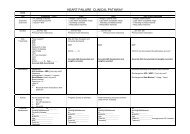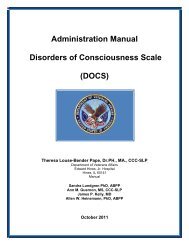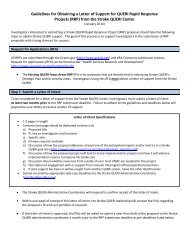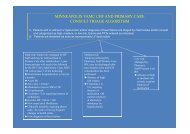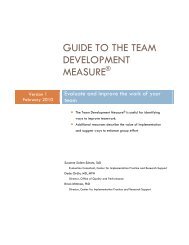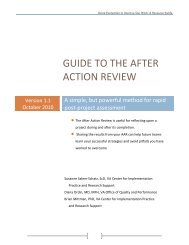The Veteran Supported Education Service Treatment Manual: VetSEd
The Veteran Supported Education Service Treatment Manual: VetSEd
The Veteran Supported Education Service Treatment Manual: VetSEd
Create successful ePaper yourself
Turn your PDF publications into a flip-book with our unique Google optimized e-Paper software.
D. Competencies of the Peer <strong>Supported</strong> <strong>Education</strong> Provider<br />
Develops positive relationships with educators by learning about their<br />
schools/training programs, enrollment practices, etc., over multiple visits.<br />
Utilizes good student interviewing skills in order to learn about <strong>Veteran</strong><br />
preferences, past experiences, hopes and concerns regarding education.<br />
Effectively collaborates with mental health providers, VR counselors, family<br />
members and other members of the vocational unit.<br />
Utilizes a strengths-based approach when serving students by recognizing each<br />
person‘s skills, experiences, personal values that support education.<br />
Employs a recovery-based orientation including the belief that people learn from<br />
their experiences, develop new skills, and achieve life goals over time.<br />
Effectively shares one's own experience as a <strong>Veteran</strong>‘s peer to inspire hope and<br />
provide a model for recovery and educational success.<br />
Uses a problem-solving approach when faced with challenging or difficult<br />
situations.<br />
Appendix K lists some of the competencies for the VHA peer mental health provider that<br />
are taken from the Department of <strong>Veteran</strong>s Affairs Peer Specialist Training <strong>Manual</strong> (U.S.<br />
Department of <strong>Veteran</strong>s Affairs, 2011). We append this list for your reference to indicate<br />
the full range of competencies that are likewise relevant to the peer supporter positions<br />
described here.<br />
E. Recruiting Peer <strong>Education</strong> Providers<br />
<strong>The</strong> domain of mental health peer support is being increasingly defined and implemented<br />
in VA and in mental health systems. You may be able to find good candidates for a peer<br />
<strong>VetSEd</strong> provider among the mental health peer technicians in your VA and among the<br />
Homeless <strong>Veteran</strong>s <strong>Supported</strong> Employment peer labor pool. We find that many <strong>Veteran</strong>s<br />
are inspired to help their own. One route to obtaining peer supporters if there are none at<br />
your VA would be offer peers opportunities to get peer certification training and then<br />
apply for your positions.<br />
Provided below is a list of questions that may be helpful when you are interviewing<br />
candidates for the peer <strong>VetSEd</strong> provider position. In italics below are sample questions<br />
for candidate interviews along with suggestions for things that interviewers can listen for.<br />
156 | P a g e



